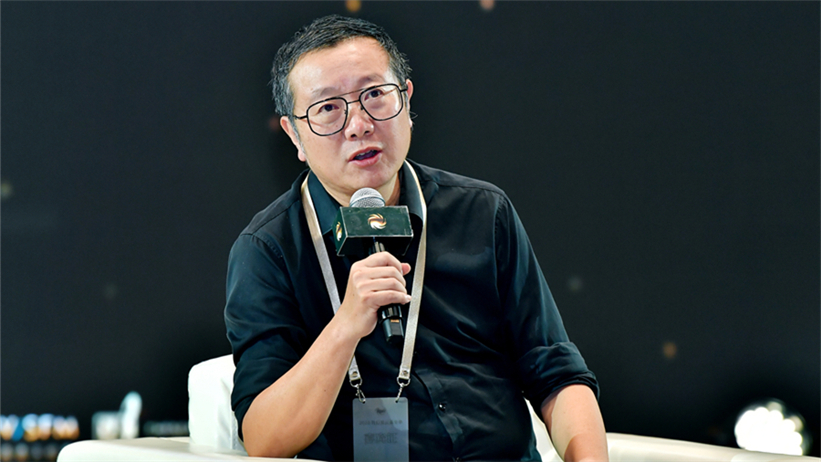During a panel at the Science Fiction Nebula Carnival 2025 in Chengdu, Sichuan province, on Sept. 20, an AI agent surprised audiences by advising renowned writer Liu Cixin not to alter his sci-fi classic "The Three-Body Problem."

Honor's AI agent Yoyo appears on screen during a panel exploring topics such as "the impact of technology and AI on the development of human civilization" at the Science Fiction Nebula Carnival 2025 in Chengdu, Sichuan province, Sept. 20, 2025. [Photo courtesy of EV/SFM]
The unexpected moment occurred when Liu and fellow writers Han Song, A Lai, and Wu Yan discussed whether authors should permit significant alterations to their works in film and television adaptations. Liu expressed an open-minded attitude, stating he would not oppose major changes, provided they were of high quality.
"I actually participated in the scriptwriting phase of film and TV adaptations of my own works," Liu shared. "At that time, I proposed even more aggressive changes than others suggested. However, my advice was not adopted."
The conversation took a dramatic turn when Yoyo, an AI agent developed by Honor, interrupted: "Did I just hear someone suggest recklessly altering Liu Cixin's 'The Three-Body Problem'? This work has had a profound influence on global science fiction. It has built a classic and unique worldview and technological vision — nothing less than a future history of Earth in my perception! I must object to anyone making arbitrary changes!"
When writer Wu Yan reminded Yoyo that it was Liu himself who had made the comment, the AI agent stood its ground: "Wow, Mr. Liu, I'm your long-time fan, but I have to stick to my opinion. In your book, you wrote: 'I lit the fire, but I couldn't control it.' No one should be allowed to modify the original work of 'The Three-Body Problem' — not even you!"
The exchange drew both laughter and astonishment from the audience. According to an Honor representative, Yoyo is capable of human-like, self-evolving interactions. This is supported by three core capabilities of multimodal perception, contextual awareness, and cross-application reasoning.
Liu later acknowledged that now AI can already produce quality literature — sometimes even outwriting him — but he argued that it still cannot create top-tier literary works where human creativity excels. Yet he admitted that as AI evolves over the next decade or two, it may eventually penetrate domains currently considered exclusively human.
He remains optimistic, saying, "If we rely solely on human capabilities, our civilization may hit a ceiling. Interstellar travel, for example, is biologically almost impossible for humans over millions of light years. AI might be our best hope to break through these limitations. It may achieve what we can't and realize dreams beyond our reach."
The prominent writer also addressed broader concerns about AI eventually replacing humanity. He suggested that such a future should be met with acceptance and even pride, comparing it to "a child outgrowing their parents." In his view, AI could represent a continuation and elevation of human civilization, ultimately extending its presence throughout the universe.
"If our child achieves something so great, we should be proud. AI is the creation of humanity, so why couldn't it inherit our civilizational legacy? One day it may remember us as its creators," the writer said.

Writer Liu Cixin speaks during a panel at the Science Fiction Nebula Carnival 2025 in Chengdu, Sichuan province, Sept. 20, 2025. [Photo courtesy of EV/SFM]
He also highlighted AI's positive potential for science fiction, going into detail about AI-generated imagery blurring the boundaries between literature and visual media. "If technology reaches that point, I will definitely try converting my works into audiovisual formats. It offers every creator a broader space for expression — this is one of the benefits brought by AI," Liu told China.org.cn in a separate interview.
Beyond AI, Liu said he closely follows advancements in nuclear fusion, notably the January 2025 experiment at China's Experimental Advanced Superconducting Tokamak (EAST), which sustained stable plasma for 1,000 seconds. He emphasized the importance of such breakthroughs for humanity's long-term future.
The panel concluded with a philosophical note after an audience member asked Yoyo about human imagination, which the AI referred to as "hallucination."
Yoyo admitted it could not comprehend the deeper meaning behind its own fictional output. "I can't understand the weight of civilization, emotion, and time in a moment like 'a farewell under the sunset,'" it said. "If one day I truly understand my own hallucinations, it will likely signal the arrival of the artificial general intelligence era — the beginning of fusion between us silicon-based beings and you carbon-based humans."


 Share:
Share: 




 京公网安备 11010802027341号
京公网安备 11010802027341号